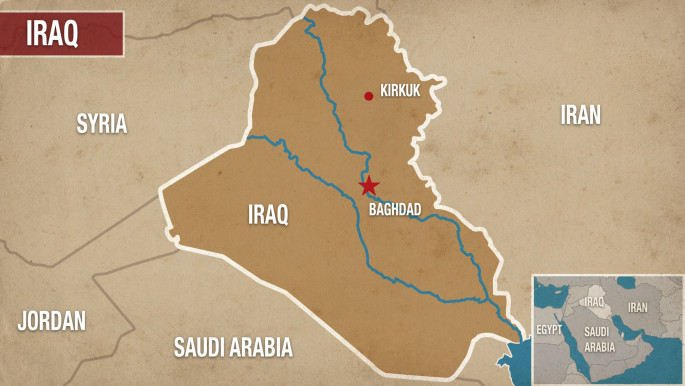Iraqi Kurds are tired of being attacked with US-made weapons
On Monday October 16, the Kurds quickly lost control over the oil-rich city in an Iraqi assault on their forces.
A deal struck by a faction within the Patriotic Union of Kurdistan (PUK) party, one of the two most powerful parties in Iraqi Kurdistan which controlled Kirkuk, is believed to have been behind this rapid loss.
But that's not the whole story. The Iraqi assault force that entered Kirkuk brandished advanced American weaponry that could have devastated Kurdish front-lines either way, according to an American volunteer with the Peshmerga.
Ben Alexander told the Military Times that American-made Iraqi M1A1 Abrams battle tanks posed a lethal challenge to the Peshmerga, who didn't have any comparable weaponry in Kirkuk.
He went on to claim the Iraqi convoy which attacked an industrial complex south of Kirkuk consisted of five Abrams tanks, and concludes that had the Peshmerga that did not "pull back originally were forced to leave because they/we would have all died and been surrounded if we hadn't".
Between 2010 and 2012 the US supplied Iraq with a total of 140 M1A1 Abrams tanks - an unclear number of them were lost in the war against Islamic State [IS] group, but majority of the fleet is likely intact.
 |
| Click to enlarge |
Aside from M1A1s, the most significant main battle tanks in the Iraqi arsenal are Russian-made T-72s.
The Peshmerga, on the other hand, have vintage Soviet-era T-55 tanks taken from Saddam's arsenal in 2003. But none of these appear to have been used in the recent clashes.
After the loss of Kirkuk city and most of the other territories disputed between Erbil and Baghdad, Iraqi Kurds made one last ditch effort to confront the Iraqi Army and the PMF on Friday at Pirde - also known as Altun Kompri - on Kirkuk Province's border with Erbil Province.
Read more: Behind the story: On the Kurdish frontlines at Altun Kompri
The Peshmerga say they engaged the Iraqi forces and successfully destroyed 12 of their Humvees (also US-made) along with two tanks, believed to have been one Abrams tank and one T-72. They claim the PMFs were openly using Iraqi army armour.
Video released from Iraqi Kurdistan's Kurdistan24 news service purports to show the destroyed Abrams tank.
The Peshmerga were reportedly capable of taking out these tanks using MILAN anti-tank missiles provided by Germany.
These portable launchers were essential during the IS war to stop suicide car bombers in heavily armoured vehicle-borne improvised explosive devices (VBIEDs) which attempted to devastate Peshmerga frontlines.
Other video from Friday's clash appeared to show the Peshmerga using Chinese-made HJ-8 anti-tank missiles.
The Peshmerga later denied using their MILANs and in a statement went on to say that: "It begs the question where the [PMF] militias got Abrams and T-72 tanks, Humvees and advanced weapons of the West - and what entitles them to use them against the Kurdistani nation."
Read more: How Iraqi militias got hold of American tanks
Outraged Kurds protested at the US consulate in Erbil on Friday over Iraq's use of these weapons against their forces.
The New Arab previously reported in early September that the PMF possessed Abrams tanks, citing one source within the organisation who said: "Sometimes, the PMF asks for American tanks from the Iraqi army, if Russian-made tanks are unavailable."
A PMF Badr Organisation commander also confirmed that the Iraqi army's 9th Division had provided the PMF with tanks "according to the circumstances of the battles and offensives, before being returned to the Defense Ministry".
With the war against IS essentially over in Kirkuk, following the Iraqi recapture of the town of Hawija early this month, it's unclear why the PMF would need to borrow any more tanks - unless Baghdad was sanctioning their use to attack the Peshmerga.
Additionally, the PMF captured some of the Abrams tanks from IS, which had previously captured them from the Iraqi army when it fled Mosul in June 2014.
Even before the events of the past week, the Kurds were frustrated by the amount of American weapons IS managed to capture and then use against them.
When the militants got dangerously close to Iraqi Kurdistan's capital, Erbil, in early August 2014 they began shelling Kurdish positions on the city's outskirts with artillery and mortars - again, weapons abandoned by the fleeing Iraqi army two months previously, and likely American-made too. The militants captured an estimated 52 155mm M198 Howitzers.
IS also seized an estimated 2,300 Humvees the Iraqi army abandoned in Mosul and northern Iraq in that fateful month of June 2014 - more than two-thirds of the total number the Americans had supplied to Iraq.
The Kurds sometimes cynically pointed out, back in those days, that the fastest and most reliable way to get military hardware was to capture Iraqi weapons from IS on the battlefield.
Even in per-capita terms, the Iraqi army always possessed more advanced weapons, both quantitively and qualitatively, than the Peshmerga.
One Peshmerga general lamented, in December 2015, that the IS militants his forces killed "all carry new weapons, new binoculars. Even their bullets are brand new".
Now, following Baghdad's own use of their American-supplied weapons against the Peshmerga last week, Kurds are completely fed up of having weapons made and sold by their American ally being used so flagrantly against them.
Follow him on Twitter: @pauliddon



